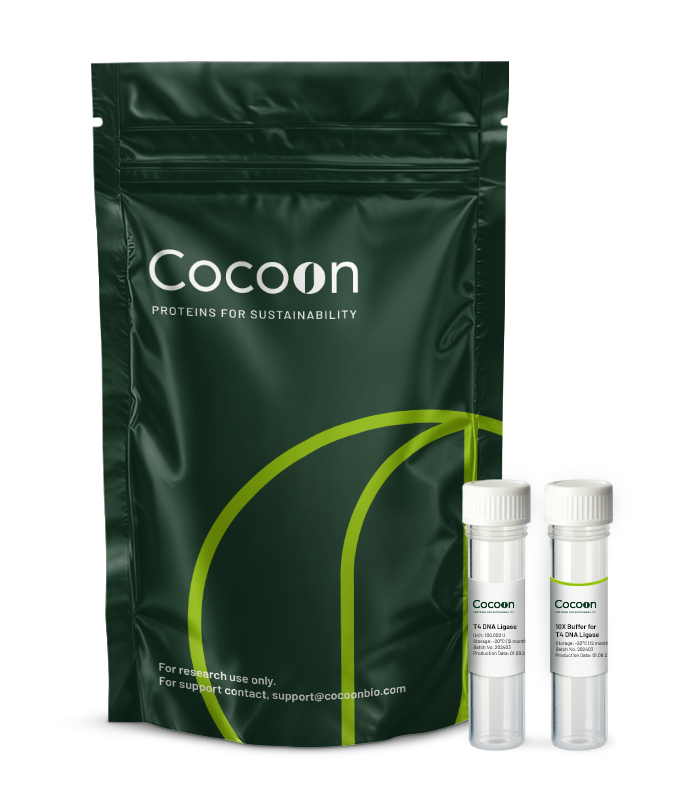T4 DNA Ligase is prepared with CrisBio® using a recombinant baculovirus carrying a T4 Bacteriophage gene to inoculate Trichoplusia ni chrysalises.

T4 DNA Ligase
For research only
Our T4 DNA Ligase is an essential enzyme for molecular biology workflows, enabling the efficient covalent joining of DNA fragments. It catalyzes the formation of phosphodiester bonds between adjacent nucleotides, allowing the ligation of both cohesive- and blunt-ended DNA as well as the repair of single-stranded nicks in duplex DNA.
Supplied with ligation buffer 10X
Product specification
Source
Unit Definition
One unit (U) is defined as the amount of enzyme required to ligate ≥ 90% of 3 μg of Lambda DNA-HindIII Digest in 20 min at 16°C.
Storage Buffer
10 mM Tris-HCl pH 7.4, 50 mM KCl, 1 mM DTT, 0.1 mM EDTA and 50% Glycerol.
Molecular Weight
57 kDa.
Format
Liquid.
Available in
High Concentration
100,000 U (0.05ml at 2,000,000 U/ml): €170
400,000 U (0.20ml at 2,000,000 U/ml): €600
Low Concentration
100,000 U (0.25ml at 400,000 U/ml): €170
400,000 U (1ml at 400,000 U/ml): €600
For customized orders please contact us

Quality Control Analysis
Enzyme Activity
Determined in a 20 µl reaction in 1X Reaction Buffer containing 3 µg of Lambda DNA-HindIII Digest, incubated for 20 minutes at 16°C, resulting in ≥ 90% ligation of the DNA fragments as determined by agarose gel electrophoresis.
Protein Purity
Evaluated by SDS-PAGE of concentrated and diluted enzyme solutions followed by Coomassie stain. Purity is assessed by comparing the aggregate mass of non-specific bands in the concentrated sample to the mass of the protein of interest band in the diluted sample.
DNase Contamination
Determined by Fluorometric Assay. Use of a fluorogenic substrate that emits fluorescence after cleavage by the presence of DNases.
Residual (genomic) DNA Contamination
Evaluated by quantitative PCR: Amplification of specific genomic sequence of T ni.
RNase Activity
Detected by Fluorometric Assay. Use of a fluorogenic substrate that emits fluorescence after cleavage by the presence of RNases.
Endonuclease activity (nicking)
A 50 µl reaction containing 0.5 µg of supercoiled DNA and a minimum of 40 μg of T4 DNA Ligase incubated for 4 hours at 37ºC results in less nicked product than the lower positive control, determined by agarose gel electrophoresis.
Applications
Molecular cloning
Ligation of DNA fragments into plasmid vectors to generate recombinant DNA constructs.
Library preparation
Attachment of adapters or linkers to DNA fragments prior to high-throughput sequencing.
DNA repair
Sealing of single-stranded nicks in duplex DNA for in vitro analysis of DNA damage and repair mechanisms.
References
- Engler, M.J. and Richardson, C.C. (1982). P.D. Boyer (Ed.), 5, 3. San Diego: Academic Press
- Tabor, Stanley. “DNA ligases.” Current protocols in molecular biology 8.1 (1989): 3-14.
- Gaastra, Wim, and Kirsten Hansen. “Ligation of DNA with t 4 DNA ligase.” Nucleic Acids (1984): 225-230.
- Nilsson, Stefan V., and Göran Magnusson. “Sealing of gaps in duplex DNA by T4 DNA ligase.” Nucleic Acids Research 10.5 (1982): 1425-1437.
Request a sample or discuss quantities
Interested in testing our products in your process? Get in touch with us to request a complimentary sample for your testing needs, or if you wish to discuss order quantities, please fill in the form.
